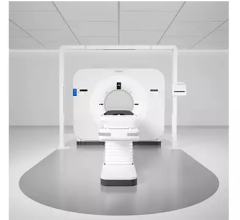May 20, 2016 — At the 18th International Leksell Gamma Knife Society Meeting in Amsterdam, May 15-19, Elekta announced the Leksell Gamma Knife radiosurgery system has been used in the treatment of more than 1 million patients. The system has been used on patients afflicted with brain tumors, vascular malformations and functional disorders.
Today, Gamma Knife surgery is performed on more than 75,000 patients every year in hundreds of hospitals and clinics around the world. The average clinical volume per treatment site has also steadily grown each year due to a proliferation of supporting clinical evidence and product enhancements that improve clinical efficiency.
Leksell Gamma Knife Icon, the newest generation of the system, is currently being used to treat patients in Europe, the United States and Asia. Icon expands on the capabilities of Gamma Knife, while providing additional frameless flexibility for either accurate single-dose administration or fractionated multiple treatment sessions over time, enabling treatment of larger tumor volumes, targets close to critical brain structures and new or recurring brain metastases.
In the coming months, installations of Icon are planned at several leading centers including The University of Texas MD Anderson Cancer Center (Houston), University of Pittsburgh Medical Center (Pittsburgh), University of Virginia Health System (Charlottesville, Va.), The Netherlands Cancer Institute-Antoni van Leeuwenhoek Hospital (Amsterdam, Netherlands) and Centre Hospitalier Universitaire Vaudois (Lausanne, Switzerland).
Metastatic brain tumors and other neurological disorders negatively impact survival and quality of life in a large and growing patient population. Worldwide, more than 256,000 new cases of brain and other central nervous system (CNS) tumors are diagnosed annually, with an estimated 189,000 deaths.
“Gamma Knife radiosurgery is a proven approach that has helped us resolve complex brain lesions, vascular complications and other neurological abnormalities, many of which were previously thought to be inoperable,” said Jean Regis, M.D., neurosurgeon and Gamma Knife program director, University Hospital La Timone, Marseille, France, who has performed more than 16,000 Gamma Knife procedures. “Over the past four decades, we’ve established a wide body of clinical evidence supporting Gamma Knife radiosurgery in the treatment of diverse brain and central nervous system pathologies, and in my experience, this is an attractive option for patients and clinicians, enabling a significant reduction in radiation exposure to healthy tissue and a negligible post-procedural convalescence period where the typical patient can usually leave the hospital within an hour.”
Douglas Kondziolka, M.D., a researcher and neurosurgeon who has performed many thousands of Gamma Knife procedures, added “Gamma Knife radiosurgery is an excellent example of how evolving cancer care technologies are addressing growing demand for precision medicine, where treatments can be precisely tailored to an individual’s unique anatomy and biologic makeup while simultaneously helping to reduce the risk of damaging healthy tissue. As one of the most comprehensively studied tools in the neurosurgery armamentarium, we can confidently offer this treatment option as a minimally invasive alternative to traditional brain surgery or whole brain radiation therapy for properly selected patients.”
“Receiving a brain tumor diagnosis is nothing short of shocking, but I feel incredibly fortunate to have discovered an effective alternative to traditional open surgery,” said Josh Perry, 27-year-old pro BMX athlete who underwent an open craniotomy for a meningioma and then received Gamma Knife to treat a recurrence several years later. “In contrast to my first procedure, which took six hours and required a two month recovery, I was up and talking minutes after receiving Gamma Knife and back on my bike within a week.”
Stereotactic radiosurgery is a non-invasive alternative to traditional brain surgery and radiation therapy for the treatment of complex, difficult to treat brain conditions. Using up to 192 precisely focused sources of radiation, Gamma Knife controls malignant and nonmalignant tumors, as well as arteriovenous malformations, essential tremor and trigeminal neuralgia while limiting damage to healthy tissue. The extremely high precision of Gamma Knife surgery is achieved using a three-dimensional coordinate system to locate and treat small targets inside the head.
For more information: www.gammaknife.com


 November 04, 2025
November 04, 2025 









